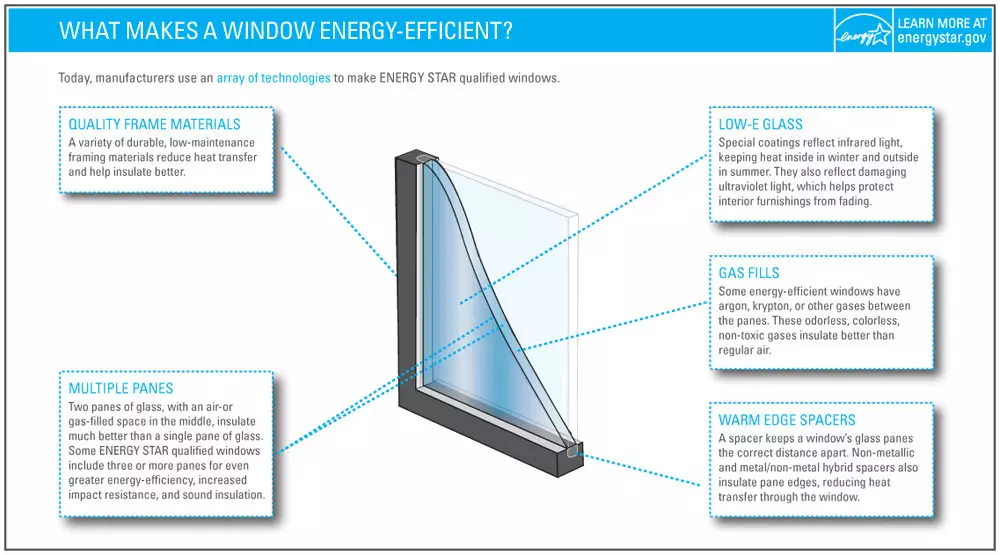Energy-Efficient Windows
Energy-efficient windows minimize the need for heating, cooling, and artificial lighting by using some combination of window glazes, multiple panes, tightly-sealed edges, insulated frames, and gas fills. In a typical home, roughly 30% of heating and air conditioning is lost through the windows!
Energy loss happens through conduction, radiation, convection currents, and air leakage, but energy-efficient windows are an effective way to combat these processes and cut back on energy use. The success of energy-efficient features varies based on climate, window direction, and how a window fits into overall home design, so homeowners should carefully consider which types of windows best fit their needs. The National Fenestration Rating Council, ENERGY STAR, and the U.S. Department of Energy (DOE) rate windows on their efficiency and suitability for different regions and purposes. Many of the same guiding principles in choosing efficient windows also apply to skylights and glass doors. Read more on the ENERGY STAR website.
Specifications
U-factor: measures how much heat is conducted through a window. This rating may apply to the whole window fixture (glass, frame, spacers, etc.) or only to the glass itself. A low U-factor signifies that a window is well-insulated and therefore more energy-efficient. A rating of 0.30 or below is considered very good.
Solar heat-gain coefficient (SHGC): the fraction of solar heat energy that passes through a window. SHGC can improve indoor climate control through the installation of high-SHGC (>0.55) windows in cold climates and low-SHGC (<0.40) windows in warm climates.
Visible transmittance (VT): the amount of visible light that can pass through a window. VT is measured on a scale of 0 to 1, where 0 signifies no light transmittance and 1 is complete light transmittance. High VT can reduce the need for artificial lighting inside a home. Coatings, glazes, and tints can reduce VT—unless they are spectrally selective (meaning they screen out certain wavelengths of solar radiation, mainly infrared, while allowing most visible light to pass through).
Light-to-solar gain (LSG): ratio of VT to SHGC. A high LSG rating is given to a window that lets through a lot of light relative to the amount of heat.
Low-emissivity (low-e) glazes: transparent metal-oxide insulators that block longer wavelengths of energy while still allowing visible light (shorter wavelengths) to pass through. Low-e windows work well for keeping heat either inside or outside of a building, depending on climate. In fact, adding a low-e coating to a window adds as much extra insulation as an extra pane of glass! Glazes may also help avoid condensation on the inside of windows, as well as fading of fabric, paper, or wood furnishings. They are added to one of the two inter-pane surfaces, depending on climate and manufacturer.
Air leakage: low air leakage is always good. Windows should have a leakage rating of less than 0.30 cubic feet per minute per square foot of window and should be properly installed to avoid leaks around the edges. Windows that open outward, like awnings or casements, close more tightly than sliding windows.
Gas fills: some double-paned windows are made with an inert gas such as argon or krypton in the inter-pane space because they are better insulators than air.
Cost and Maintenance
Window prices depend more on type and size than anything else, so many manufacturers now offer comparably priced efficient windows. With that in mind, energy-efficient windows are an investment in a building and even when they do cost more, they will pay themselves off within a few years through decreased heating and cooling costs—and will continue to save money throughout their lifespan.
Well-placed windows can decrease the need for artificial lighting by allowing in natural light, which will also help save on energy costs. If efficient windows are installed as part of a new construction project, a smaller, more affordable heating and cooling system may be sufficient for the building.
Decrease heating and cooling costs with an upgrade to Anlin energy efficient windows. Call (855) 995-2233 today to get a FREE ESTIMATE!
Select Home Improvements is the best choice if you are looking for a home improvement contractor. If you have questions about your project please contact Select Home Improvements. We are here to assist you.
Call us at (855) 995-2233.


